Cossacks of Ukraine and Russia - five main differences
Attempts to compare the Ukrainian and Russian Cossacks have been undertaken for a long time and at the same time were rarely correct. In recent years, when everything Russian was declared in Ukraine “hostile”, “wrong” or, conversely, “stolen from the Ukrainians”, there can be no talk of any objective comparison. However, we still try to find the main differences between those people who in different centuries in two neighboring lands called themselves Cossacks.
Naturally, this will not be about who wore the harem pants - but who is wearing a riding breeches with red stripes, and not about the presence or absence of “osledets” on the Cossack heads (with which, if you believe the chronicles, the first to be seen were the soldiers of Prince Svyatoslav of Kiev - common ancestors both peoples). Let's talk about the things, so to speak, fundamental and most important.
Allegiance to the oath
It is not for nothing that the Russian Cossacks were called in the Empire the support of the throne and order. They took an active part in the suppression of all sorts of riots and troubles in Russia until the fall of the monarchy, and after that tens of thousands fought and died for the White movement. At the same time, one cannot help but recall that the two uprisings of the Cossacks themselves shocked Russia more than all the "peasant wars" combined. This, of course, is about the events associated with the names of Stepan Razin and Emelyan Pugachev. Cossacks knew how to rebel, and how! But…
After the Don Cossacks took the oath of allegiance to the Emperor with a cross kiss, there was no question of any conspiracies and riots in him! Word - E.P. Savelyev, the author of the book “The Ancient History of the Cossacks”: “The Don army ... as a direct people, direct and honest and, moreover, sincerely religious, tried to fulfill their obligations to the best of their ability. Any slightest violation of this oath, even in individual cases, was considered a great crime, a shame for the entire army ... "
The Ukrainian Cossacks in this respect were the exact opposite of their Russian counterparts. The antipodes, you can say! With whom only didn’t they conclude agreements on “eternal friendship”, who only didn’t swear allegiance to, and what rulers didn’t swear to ... Then to break all their own vows at the first opportunity that turned up. The “patriotic” historians of Ukraine can repeat as much as they like that the hetman Mazepa was anathematized by the Orthodox Church for “wanting to make the Ukrainian free” (which in itself is nonsense, because Mazepa simply sold it to the king of Sweden!). But the truth is that the hetman was not betrayed for treason by the church curse not to the tsar, but to the oath just given to him, which in those centuries was considered absolutely indestructible - kissing the cross. This oath, in fact, was not given to the Emperor, but to God - hence the punishment.
However, a similar "free attitude" to the undertaken obligations (eternal and indestructible, but what!) The Ukrainian Cossacks showed not only with the Sovereigns of Russia, but also the Polish-Lithuanian Commonwealth, as well as other European monarchs. There is nothing to talk about all the khans and sultans there. These guys were real "masters of their word": they gave it themselves - they took it back and forth ...
Cooperation with foreign conquerors
From the previous paragraph, the following smoothly follows - aiding various foreign hordes and, in modern terms, “military cooperation” with those. Mazepa already mentioned above, with its sale to the Swedish king Karl, is a well-known example. Much less historians liked to remember (especially in Soviet times, so as not to destroy the “friendship of peoples”) about the terrible and bloody role that the Ukrainian Cossacks played in the Time of Troubles, together with the Poles, robbing, killing, raping and burning everything that is possible to Russia. Their horde, led by Sagaidachny and Doroshenko, outraged from Putivl (now the territory of Ukraine) to Moscow, leaving behind a terrible and shameful memory.
Even less is said that the descendants of the Cossacks, considered to be the "standard" of the Ukrainian Cossacks, for many years, or rather centuries, worked diligently and diligently to serve the Ottoman Empire. And by no means engaging in tillage. Cossacks of the so-called Second and Third Sections, based on Turkish territory by renegades, participated in the Russian-Turkish wars on the side of the Ottoman port, and under its own banner they suppressed the uprising in Greece in 1821, by spilling the river of Orthodox blood.
There is only one shameful spot on the conscience of the Russian Cossacks - cooperation with the Nazis during the years of World War II. There is nothing you can do about it - no matter how some historians try to bring under this vileness a “base” in the form of revenge for “talking up” and other cruelties committed by the Bolsheviks on the same Don and Kuban, there can never be any justification for cooperation with the Nazis. However, I emphasize once again - the Russian Cossacks (and even that - far from most of them) were under the enemy banners once. For the Ukrainians, this was a perfectly normal practice.
Mercenary
It is not surprising that with this attitude to morality, the most common thing for the Ukrainian Cossacks was mercenary. The Russian Cossacks fought for Faith, Tsar and the Fatherland. It could even fight among themselves ... But, exclusively for money - never! The Russian Cossacks were not mercenaries. Ukrainian “knights” were noted throughout Europe and beyond. And even in this field, they managed to earn, to put it mildly, not the best fame.
The wars in Saxony, Luxembourg, France, Austria, the Balkans and Moldova are far from a complete list of places where Ukrainian Cossacks acted as “soldiers of fortune”. At the same time, their motto was “Cossacks do not fight on credit!” As soon as one of the employers delayed payments, or paid too little, according to the Cossacks, the amount, as they calmly abandoned the war and went home. But this is at best! They could easily go over to the side of the enemy.
This is exactly what half of the Cossacks hired in Ukraine by Cardinal France Mazarin for the war against the Huguenots and their allies - the Spaniards - who settled in La Rochelle, did the same. After the capture of Dunkirk, offended by the employer (who seemed to have “thrown” them with money), half of the “knights” returned to their homes, and the second ... went over to the Spaniards. Those, apparently, paid well, and according to some historians, the Ukrainian Cossacks fought on their side against the French for another ten years.
With all this, the military qualities of mercenary Cossacks extolled by some were more than dubious. Being, in essence, nothing more than irregular light cavalry, they had discipline and training, as they say today, “below the plinth,” but they were extraordinarily prone to looting and robbery.
Native blood
No matter how the Russian Cossacks, who were not at all distinguished by their meekness of temper and gentleness of character, fought with their whips, there were no cases of their mass shedding of blood before the Civil War, in general. Well, perhaps, with the exception of all the same riots of Razin and Pugachev. However, this, too, it could be said, was a civil war in miniature ... The Russian Cossacks are reproached with special cruelty except in relation to "foreigners" and "non-believers."
Not at all the Ukrainian Cossacks. At one time, they especially liked to “frolic” in the territory of present Belarus, which then, by the way, as Ukraine, was part of the Commonwealth. Cossack chieftains Koshka and Kutskovich, actually sent by the Polish king on a campaign against Sweden, having taken by storm, plundered Vitebsk and Polotsk. By the way, somewhat earlier in the same lands, another ataman - Severin Nalyvaiko, who completely devastated Mogilev, passed the plague. The atrocities and atrocities perpetrated by Ukrainian Cossacks in the Belarusian lands forced the then chroniclers to brand them with the definition “worse than the Tatars”.
In order to take away a sort of “palm” from the Tatars, who were considered “absolute champions” in robbery and violence not only in Russia, but also in Europe, it was necessary to try very hard. By the way, with the Tatars themselves the Ukrainian Cossacks had (at least in certain periods of history) a close and mutually beneficial friendship. Most of the victories over the Poles, Bogdan Khmelnitsky owes it to the Tatars - at the same time, as residents of Ukraine, they stole slaves as trophies. However, some Cossacks did not disdain the delivery of slave caravans to the Crimea, there are plenty of historical evidence ...
For Faith and Fatherland
Throughout its history, the Ukrainian Cossacks, especially the Zaporizhzhya, invariably proclaimed themselves "the support and defense of the Orthodox Church." In any case, it was precisely this that justified the completely unimaginable atrocities committed by his representatives against Jews and Catholics. It is widely known that Ukrainian Cossacks killed Catholic priests and monks, who were subsequently even forbidden to bury, as expected. However, this is only one side of the coin ...
With regard to Orthodox churches and clergy, the “knights” did the same terrible things. Their looting of churches and reprisals against priests are marked throughout their bloody path. Cossacks of Doroshenko in the Time of Troubles did this throughout the Russian land, where they went, and the Belarusian priest compared the Tatars of the Ukrainian Cossacks. Surely, he knew what he was writing about. Participation in wars with fellow believers on the side of the terrible enemy of Orthodoxy - the Ottoman Empire and the massacre, along with its Janissaries of the Orthodox Greeks, also say a lot.
The role of the Russian Cossacks in the history of Russia may seem ambiguous and sometimes contradictory to some. However, it is indisputable that it was the Russian Cossacks who, with their blood, obtained many lands for Russia - Siberia, the Urals, the Far East, and for centuries stood guard over its borders in the South and the Caucasus. The Ukrainian Cossacks did not bring the slightest increment to the land that gave birth to it — it almost destroyed it completely. The worst period from 1657 to 1687, called “Ruin” in Ukrainian history, was generated precisely by a crazy thirst for the power of hetmans - the leaders of the Ukrainian Cossacks. During this time, they swore allegiance to Russia, then Poland, then Turkey, was replaced by a dozen and a half. On the territory of Ukraine, everything that was possible was looted and destroyed, and human casualties did not give in to calculation ...
As a result, the Ukrainian Cossacks finally degenerated into an outspoken gang that bore the name of the Zaporizhzhya Sich and was rightly eliminated by Empress Catherine II. In true conditions of a normal, civilized state, it proved to be simply incapable of true service to the Fatherland. Perhaps this is the main difference between the Ukrainian Cossacks and the Russian ...
Naturally, this will not be about who wore the harem pants - but who is wearing a riding breeches with red stripes, and not about the presence or absence of “osledets” on the Cossack heads (with which, if you believe the chronicles, the first to be seen were the soldiers of Prince Svyatoslav of Kiev - common ancestors both peoples). Let's talk about the things, so to speak, fundamental and most important.
Allegiance to the oath
It is not for nothing that the Russian Cossacks were called in the Empire the support of the throne and order. They took an active part in the suppression of all sorts of riots and troubles in Russia until the fall of the monarchy, and after that tens of thousands fought and died for the White movement. At the same time, one cannot help but recall that the two uprisings of the Cossacks themselves shocked Russia more than all the "peasant wars" combined. This, of course, is about the events associated with the names of Stepan Razin and Emelyan Pugachev. Cossacks knew how to rebel, and how! But…
After the Don Cossacks took the oath of allegiance to the Emperor with a cross kiss, there was no question of any conspiracies and riots in him! Word - E.P. Savelyev, the author of the book “The Ancient History of the Cossacks”: “The Don army ... as a direct people, direct and honest and, moreover, sincerely religious, tried to fulfill their obligations to the best of their ability. Any slightest violation of this oath, even in individual cases, was considered a great crime, a shame for the entire army ... "
The Ukrainian Cossacks in this respect were the exact opposite of their Russian counterparts. The antipodes, you can say! With whom only didn’t they conclude agreements on “eternal friendship”, who only didn’t swear allegiance to, and what rulers didn’t swear to ... Then to break all their own vows at the first opportunity that turned up. The “patriotic” historians of Ukraine can repeat as much as they like that the hetman Mazepa was anathematized by the Orthodox Church for “wanting to make the Ukrainian free” (which in itself is nonsense, because Mazepa simply sold it to the king of Sweden!). But the truth is that the hetman was not betrayed for treason by the church curse not to the tsar, but to the oath just given to him, which in those centuries was considered absolutely indestructible - kissing the cross. This oath, in fact, was not given to the Emperor, but to God - hence the punishment.
However, a similar "free attitude" to the undertaken obligations (eternal and indestructible, but what!) The Ukrainian Cossacks showed not only with the Sovereigns of Russia, but also the Polish-Lithuanian Commonwealth, as well as other European monarchs. There is nothing to talk about all the khans and sultans there. These guys were real "masters of their word": they gave it themselves - they took it back and forth ...
Cooperation with foreign conquerors
From the previous paragraph, the following smoothly follows - aiding various foreign hordes and, in modern terms, “military cooperation” with those. Mazepa already mentioned above, with its sale to the Swedish king Karl, is a well-known example. Much less historians liked to remember (especially in Soviet times, so as not to destroy the “friendship of peoples”) about the terrible and bloody role that the Ukrainian Cossacks played in the Time of Troubles, together with the Poles, robbing, killing, raping and burning everything that is possible to Russia. Their horde, led by Sagaidachny and Doroshenko, outraged from Putivl (now the territory of Ukraine) to Moscow, leaving behind a terrible and shameful memory.
Even less is said that the descendants of the Cossacks, considered to be the "standard" of the Ukrainian Cossacks, for many years, or rather centuries, worked diligently and diligently to serve the Ottoman Empire. And by no means engaging in tillage. Cossacks of the so-called Second and Third Sections, based on Turkish territory by renegades, participated in the Russian-Turkish wars on the side of the Ottoman port, and under its own banner they suppressed the uprising in Greece in 1821, by spilling the river of Orthodox blood.
There is only one shameful spot on the conscience of the Russian Cossacks - cooperation with the Nazis during the years of World War II. There is nothing you can do about it - no matter how some historians try to bring under this vileness a “base” in the form of revenge for “talking up” and other cruelties committed by the Bolsheviks on the same Don and Kuban, there can never be any justification for cooperation with the Nazis. However, I emphasize once again - the Russian Cossacks (and even that - far from most of them) were under the enemy banners once. For the Ukrainians, this was a perfectly normal practice.
Mercenary
It is not surprising that with this attitude to morality, the most common thing for the Ukrainian Cossacks was mercenary. The Russian Cossacks fought for Faith, Tsar and the Fatherland. It could even fight among themselves ... But, exclusively for money - never! The Russian Cossacks were not mercenaries. Ukrainian “knights” were noted throughout Europe and beyond. And even in this field, they managed to earn, to put it mildly, not the best fame.
The wars in Saxony, Luxembourg, France, Austria, the Balkans and Moldova are far from a complete list of places where Ukrainian Cossacks acted as “soldiers of fortune”. At the same time, their motto was “Cossacks do not fight on credit!” As soon as one of the employers delayed payments, or paid too little, according to the Cossacks, the amount, as they calmly abandoned the war and went home. But this is at best! They could easily go over to the side of the enemy.
This is exactly what half of the Cossacks hired in Ukraine by Cardinal France Mazarin for the war against the Huguenots and their allies - the Spaniards - who settled in La Rochelle, did the same. After the capture of Dunkirk, offended by the employer (who seemed to have “thrown” them with money), half of the “knights” returned to their homes, and the second ... went over to the Spaniards. Those, apparently, paid well, and according to some historians, the Ukrainian Cossacks fought on their side against the French for another ten years.
With all this, the military qualities of mercenary Cossacks extolled by some were more than dubious. Being, in essence, nothing more than irregular light cavalry, they had discipline and training, as they say today, “below the plinth,” but they were extraordinarily prone to looting and robbery.
Native blood
No matter how the Russian Cossacks, who were not at all distinguished by their meekness of temper and gentleness of character, fought with their whips, there were no cases of their mass shedding of blood before the Civil War, in general. Well, perhaps, with the exception of all the same riots of Razin and Pugachev. However, this, too, it could be said, was a civil war in miniature ... The Russian Cossacks are reproached with special cruelty except in relation to "foreigners" and "non-believers."
Not at all the Ukrainian Cossacks. At one time, they especially liked to “frolic” in the territory of present Belarus, which then, by the way, as Ukraine, was part of the Commonwealth. Cossack chieftains Koshka and Kutskovich, actually sent by the Polish king on a campaign against Sweden, having taken by storm, plundered Vitebsk and Polotsk. By the way, somewhat earlier in the same lands, another ataman - Severin Nalyvaiko, who completely devastated Mogilev, passed the plague. The atrocities and atrocities perpetrated by Ukrainian Cossacks in the Belarusian lands forced the then chroniclers to brand them with the definition “worse than the Tatars”.
In order to take away a sort of “palm” from the Tatars, who were considered “absolute champions” in robbery and violence not only in Russia, but also in Europe, it was necessary to try very hard. By the way, with the Tatars themselves the Ukrainian Cossacks had (at least in certain periods of history) a close and mutually beneficial friendship. Most of the victories over the Poles, Bogdan Khmelnitsky owes it to the Tatars - at the same time, as residents of Ukraine, they stole slaves as trophies. However, some Cossacks did not disdain the delivery of slave caravans to the Crimea, there are plenty of historical evidence ...
For Faith and Fatherland
Throughout its history, the Ukrainian Cossacks, especially the Zaporizhzhya, invariably proclaimed themselves "the support and defense of the Orthodox Church." In any case, it was precisely this that justified the completely unimaginable atrocities committed by his representatives against Jews and Catholics. It is widely known that Ukrainian Cossacks killed Catholic priests and monks, who were subsequently even forbidden to bury, as expected. However, this is only one side of the coin ...
With regard to Orthodox churches and clergy, the “knights” did the same terrible things. Their looting of churches and reprisals against priests are marked throughout their bloody path. Cossacks of Doroshenko in the Time of Troubles did this throughout the Russian land, where they went, and the Belarusian priest compared the Tatars of the Ukrainian Cossacks. Surely, he knew what he was writing about. Participation in wars with fellow believers on the side of the terrible enemy of Orthodoxy - the Ottoman Empire and the massacre, along with its Janissaries of the Orthodox Greeks, also say a lot.
The role of the Russian Cossacks in the history of Russia may seem ambiguous and sometimes contradictory to some. However, it is indisputable that it was the Russian Cossacks who, with their blood, obtained many lands for Russia - Siberia, the Urals, the Far East, and for centuries stood guard over its borders in the South and the Caucasus. The Ukrainian Cossacks did not bring the slightest increment to the land that gave birth to it — it almost destroyed it completely. The worst period from 1657 to 1687, called “Ruin” in Ukrainian history, was generated precisely by a crazy thirst for the power of hetmans - the leaders of the Ukrainian Cossacks. During this time, they swore allegiance to Russia, then Poland, then Turkey, was replaced by a dozen and a half. On the territory of Ukraine, everything that was possible was looted and destroyed, and human casualties did not give in to calculation ...
As a result, the Ukrainian Cossacks finally degenerated into an outspoken gang that bore the name of the Zaporizhzhya Sich and was rightly eliminated by Empress Catherine II. In true conditions of a normal, civilized state, it proved to be simply incapable of true service to the Fatherland. Perhaps this is the main difference between the Ukrainian Cossacks and the Russian ...
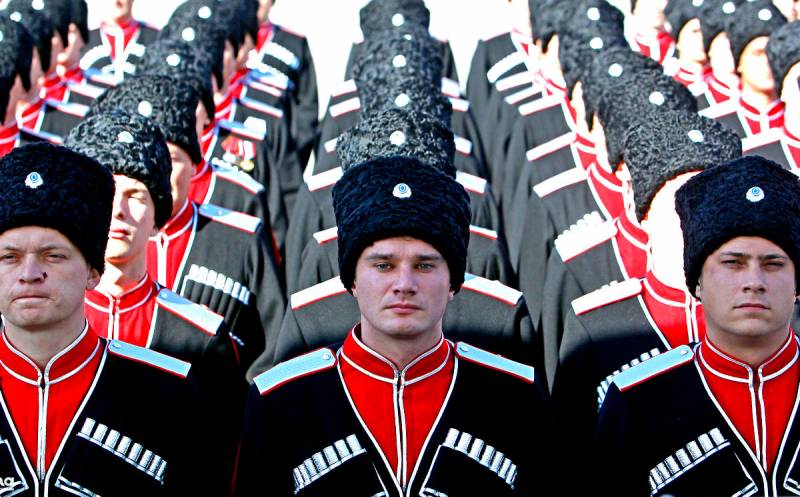
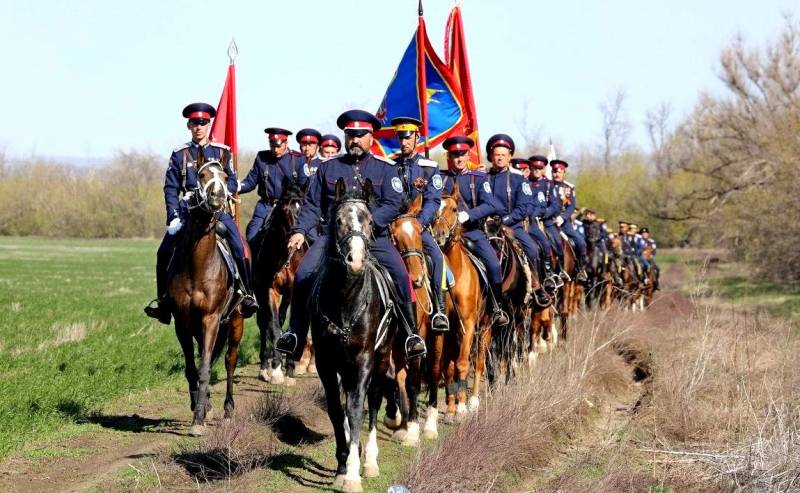
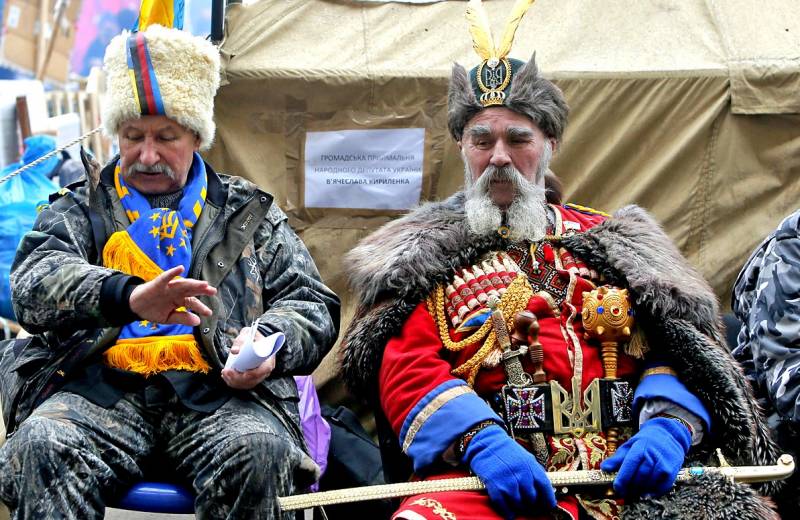
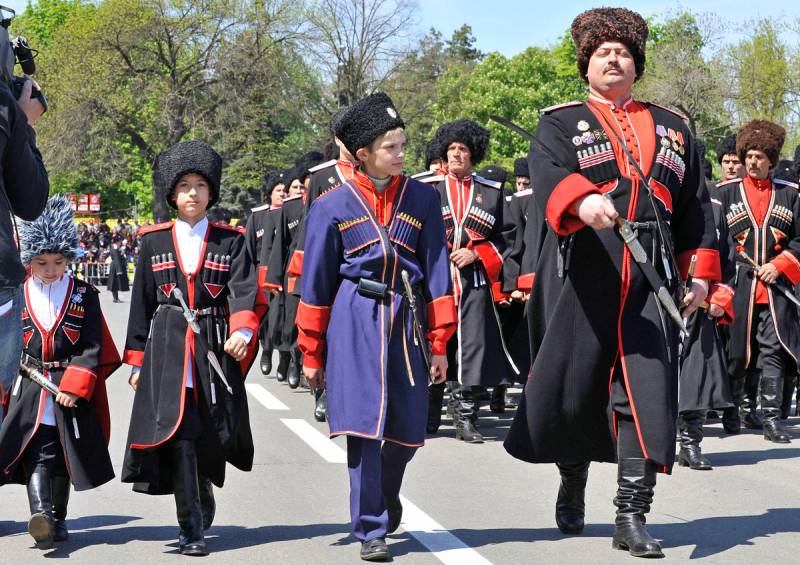
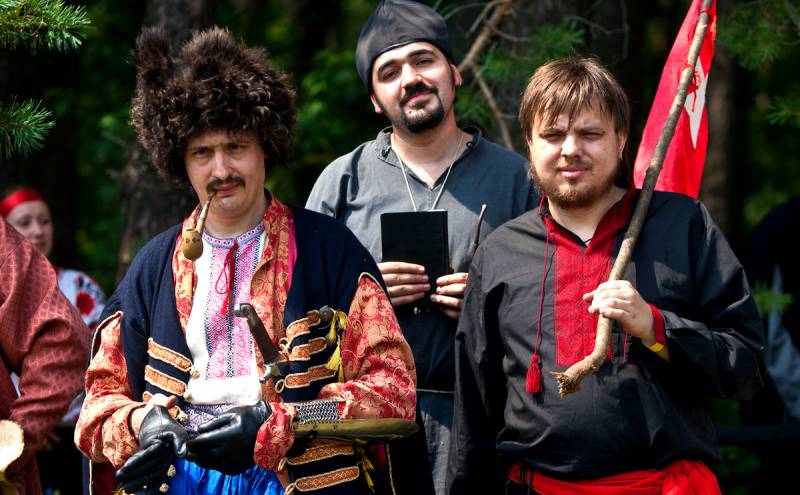
Information